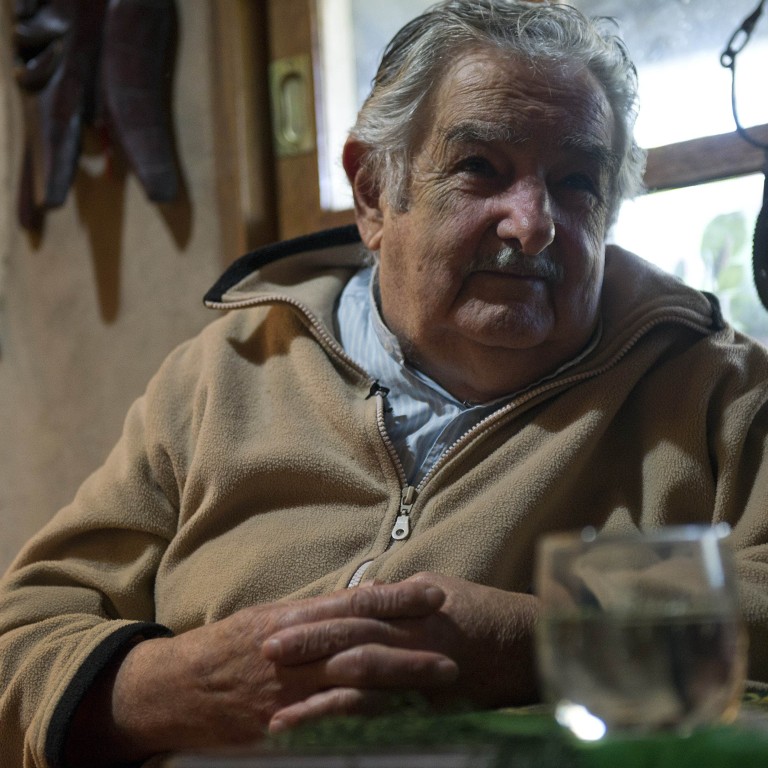
Video | Uruguay’s Mujica: the world’s ‘poorest president’
A former florist, guerrilla and prisoner now known as the world’s poorest president, Uruguayan leader Jose Mujica says he has had “an extraordinary life.”
A former florist, guerrilla and prisoner now known as the world’s poorest president, Uruguayan leader Jose Mujica says he has had “an extraordinary life.”
As he approaches his 80th birthday and retirement, the veteran leftist -- who has drawn worldwide attention for legalizing marijuana sales, slamming capitalism and opting to stay in his tiny run-down house instead of the presidential mansion -- told AFP he is still looking to the future.
“I believe we were always sensitive to a youthful, new-world way of thinking,” he said in an interview at his house on the outskirts of the capital Montevideo, which has about 45 square metres (480 square feet) of floor space and moisture stains on the walls.
“My generation, when we went to a dance, we went in a blue or black suit, patent-leather dress shoes and tie. Otherwise they didn’t let you in. The new generation wouldn’t even dream of that. Politicians have a hard time registering those tacit changes that happen without anyone proposing them.”
Sporting a grey mustache and beige cardigan, Mujica welcomes visitors without fuss and chats away on topics ranging from politics to love to religion.
“I’m an ingrate, I ought to believe in God. Because I’ve been through so many highs and lows and today I’m almost 80 years old,” he said.
Mujica, who took office in 2011 and will step down after October elections under Uruguay’s one-and-done term limit, first made waves as president with his diatribes against consumerism.
But what made him known worldwide was his push to allow the legal, regulated sale of cannabis -- a law passed in December, but whose implementation he now says must be delayed until next year because of logistical difficulties.
The small South American country has also legalized gay marriage and abortion under Mujica.
“I didn’t unveil anything new. It’s so obvious it hits you in the face,” he said of his fame. “But there’s a certain impotence in the world’s major countries, which only think about the interest of the state and who’s going to win the next election.”
Nine years in solitary
He isn’t shy about characterizing himself as a trailblazer.
“You’ve seen the presidential candidates who aren’t wearing ties? Remember I was the first lawmaker to stop wearing a tie,” he said.
He hasn’t been shy about courting controversy either -- including when he agreed to accept six inmates from the US military prison at Guantanamo Bay on human rights grounds.
Mujica was himself imprisoned for more than 13 years for fighting to topple Uruguay’s 1973-1985 dictatorship.
He was beaten, humiliated and held in solitary confinement for nine years.
For seven years he was allowed nothing to read, the “worst years” of his life and a near descent into insanity, said Mujica, who is married to a fellow ex-guerrilla who is now a senator.
“Maybe I’m actually a man of faith at heart,” he said. “I never doubted that when I got out I would keep fighting. I never, ever doubted that I would get out.”
Unusual president
Mujica refuses to “play president,” he told AFP.
“I would have to have three or four servants following me. I wouldn’t be able to get up in the middle of the night in my underwear to go to the toilet,” he said.
As a young man, he sold flowers in Montevideo’s wealthier neighborhoods, courting business from bereaved elderly women.
Then, in the 1960s, he helped found the Tupamaro urban rebel movement, whose rise contributed to the military coup in 1973.
Today he says he no longer believes in armed struggle.
“War is a barbaric, prehistoric method,” he said. “No matter what the reason for the war, the ones who pay the highest price are always the weakest and those least responsible.”
He says he has learned from his mistakes and has no regrets in his long career.
“Living intensely is worth it. You can fall down one, two, three, 20 times, but remember you can get up and start again.”
But he says he does have one regret in his personal life -- never having children.
“I dedicated myself to changing the world... and time passed by,” he said.
He jokes that maybe he was traumatized by his mother, a “hard, strong” woman whom he remembers slinging 50kg bags of cement over her arm.
When asked what he plans to do after his presidency, he cracks another joke.
“What all old people do. Give advice that nobody pays attention to.”
